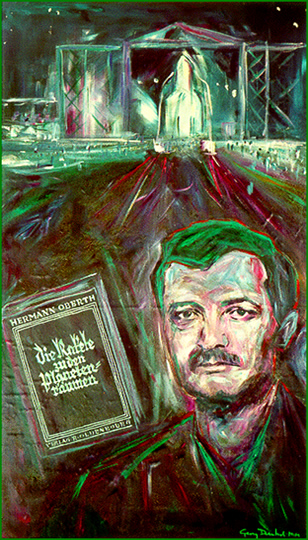



| Hermann Oberth Born 1894 in Hermannstadt, Austria-Hungary Died 1989 in Feucht near Nuremberg, Germany |
|
 |
||
|
Oberth grew up in the German-speaking part of Transylvania in the Austro-Hungarian Empire. In his youth he became interested in space travel by reading Jules Verne´s novels. 1913 he went to Munich to study medicine. His studies were interrupted by WW I, where Oberth served in the Austro-Hungarian Army in a medical corps. After the war, Oberth studied physics and sub-mitted in 1922 to the University of Heidelberg a thesis about rocket-propelled space travel. It was rejected because the idea of space travel was too utopian in academic circles. Shortly afterwards he published his work as a small booklet “Die Rakete zu den Planetenräumen” (The Rocket Into Interplanetary Space) at his own expense. The book was a great success and got much publicity, despite the fact that it was written in a very technical language, and it caused scientific discussions about a field, which was known only from fantastic (utopian, science fiction) literature. Between 1924 and 1938 Oberth worked as a teacher of mathematics and physics at a school in Mediasch, Transylvania but stayed in touch with fellow rocketry pioneers through the German Rocket Society (“Verein für Raumschiffahrt”). In 1928/29 Oberth started to build a high altitude rocket for the occasion of the première of the movie “Die Frau im Mond” by the Austrian director Fritz Lang, for which he was scientific advisor. During WW II Oberth worked at the Vienna and Dresden Universities of Technology and later became a consultant at the Peenemünde rocket plant. During all his live Oberth was creatively working in the field of rocketry but never held any prestigious leading position within that field.
Note:: Oberth’s above mentioned Austro-Hungarian roots justified to include him in this overview. However, it probably would be more appropriate to refer to him as a German (with an Austro-Hungarian background). Still, the lack of German citizenship had an important disadvantageous influence on his career in Germany.
|
||||






